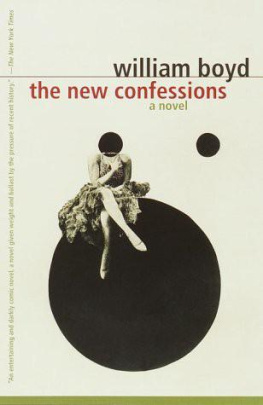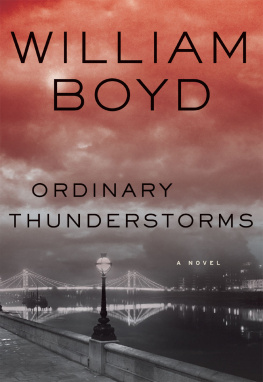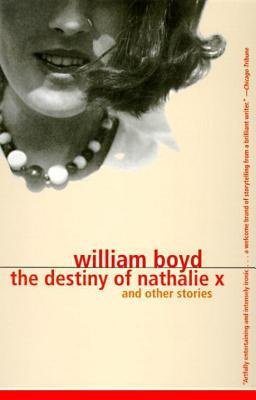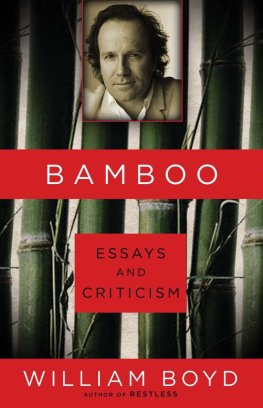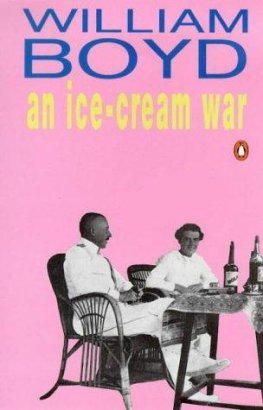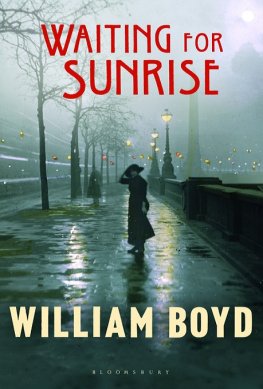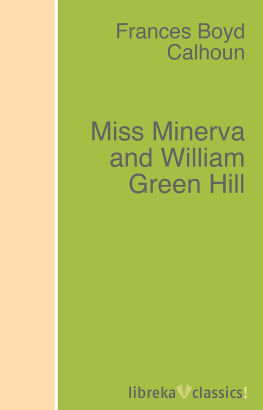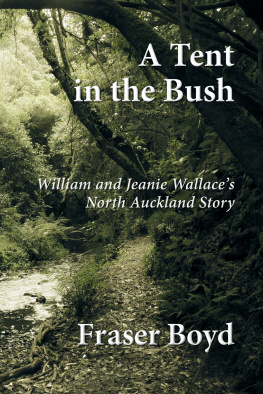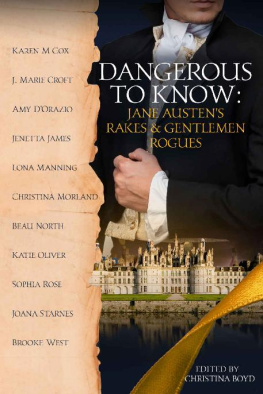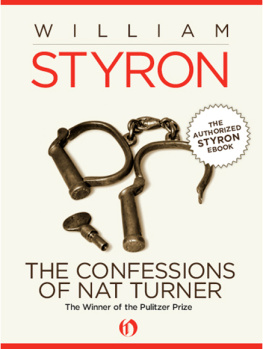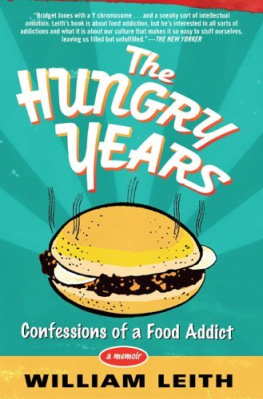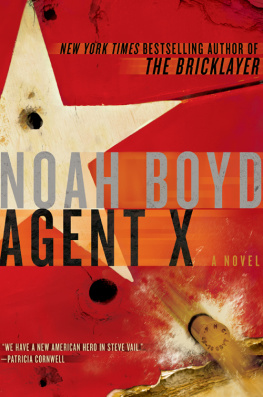William Boyd - The New Confessions
Here you can read online William Boyd - The New Confessions full text of the book (entire story) in english for free. Download pdf and epub, get meaning, cover and reviews about this ebook. year: 2000, publisher: Vintage, genre: Non-fiction. Description of the work, (preface) as well as reviews are available. Best literature library LitArk.com created for fans of good reading and offers a wide selection of genres:
Romance novel
Science fiction
Adventure
Detective
Science
History
Home and family
Prose
Art
Politics
Computer
Non-fiction
Religion
Business
Children
Humor
Choose a favorite category and find really read worthwhile books. Enjoy immersion in the world of imagination, feel the emotions of the characters or learn something new for yourself, make an fascinating discovery.
- Book:The New Confessions
- Author:
- Publisher:Vintage
- Genre:
- Year:2000
- Rating:5 / 5
- Favourites:Add to favourites
- Your mark:
- 100
- 1
- 2
- 3
- 4
- 5
The New Confessions: summary, description and annotation
We offer to read an annotation, description, summary or preface (depends on what the author of the book "The New Confessions" wrote himself). If you haven't found the necessary information about the book — write in the comments, we will try to find it.
The New Confessions — read online for free the complete book (whole text) full work
Below is the text of the book, divided by pages. System saving the place of the last page read, allows you to conveniently read the book "The New Confessions" online for free, without having to search again every time where you left off. Put a bookmark, and you can go to the page where you finished reading at any time.
Font size:
Interval:
Bookmark:
A Good Man in Africa
On the Yankee Station (short stories)
An Ice-Cream War
Stars and Bars
School Ties (screenplays)
Brazzaville Beach
The Blue Afternoon
The Destiny of Nathalie X and Other Stories
Armadillo
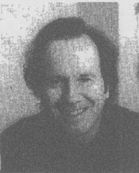
William Boyds first novel, A Good Man in Africa, won a Whit-bread Prize and a Somerset Maugham Award; his second, An Ice-Cream War, was awarded the John Llewellyn Rhys Prize and was shortlisted for the Booker; Brazzaville Beach won the James Tait Memorial Prize; and The Blue Afternoon won the Los Angeles Times Prize for Fiction. Boyd lives in London.

ARMADILLO
The life of Lorimer Black, insurance adjustor, is about to be turned upside down. The elements at play: a beautiful actress with whom he is falling in love; an odd associate whose hiring, firing, and rehiring make little sense; a rock musician whose lossin this case of his mindmay be adjusted by the insurance company. Black uncovers a web of fraud involving virtually everyone he knows, and in which he becomes increasingly entangled.
Fiction/Literature/0-375-70216-4
AN ICE-CREAM WAR
William Boyd brilliantly evokes the private dramas of a generation swept up by the winds of war. As the sons of the world match wits and weapons, desperation makes bedfellows of enemiesand traitors of friends and family. An Ice-Cream War deftly renders lives capsized by violence, chance, and the irrepressible human capacity for love.
Fiction/Literature/0-375-70502-3
THE BLUE AFTERNOON
Sprawling across three continents and two eras, this atmospheric novel opens in Los Angeles in 1936, when architect Kay Fischer is approached by an elderly man named Salvador Carriscant, who claims to be her fatherand who insists she accompany him to Lisbon in search of the great lost love of his life.
Winner of the Los Angeles Times Book Prize in Fiction Fiction/Literature/0-679-77260-X
THE DESTINY OF NATHALIE X
A tourist stranded in the Dordogne valley in the 1920s finds a French countess waiting amorously in his hotel room. A widowed Englishwoman and a Portuguese poet meet every Christmas in 1930s Lisbon to share an erotic delirium before parting for another year. These and nine more stories chart the euphoria of love, the anguish of loss, and the gnawings of ambition.
Fiction/Short Stories/0-679-76784-3
VINTAGE INTERNATIONAL
Available at your local bookstore, or call toll-free to order:
1-800-793-2665 (credit cards only).
My first act on entering this world was to kill my mother. I was heaveda healthy eight poundslacquered and ruddy from her womb one cold March day in Edinburgh, 1899. I like to think that for a few hours she knew she had another son but I have no evidence for the fact. The date of my birth was the date of her death, and thus began all my misfortunes. My father? My father was lecturing to his anatomy students at the University. Word of my mothers confinement was sent to him at once but the messengera dim porter called McPhailcould not gain admittance to the lecture theater. My fathers habit was to lock the doors from the inside and refuse to be interrupted. I believe that day he even had a cadaver on a marble slab before his lectern. The messenger, McPhail, having tried the door, peered through the portholed glass, saw the corpse and queasily decided to wait until the lecture was over. My father later emerged to learn the good and bad news. By the time he arrived at the infirmary, I was alive and his wife was dead.
How did he feel? I can almost see his bloodless bony face, the thick tufts of unshaved bristle on his cheekbones, as he looms over the cot. No emotion would be registered thereneither joy nor desperation. There might be a thin reek of camphor and formaldehyde overlaying the smell of tobacco that normally clung to his clothes (he was a sixty-a-day man). And his hands, firm on the cot frame, would be perfumed too, with carbolic, and the nails would be edged white with residues of the talcum powder that preserved the rubber of his dun, transparent operating gloves.
My father was normally a clean man, almost obsessively so, and I could never understand why he did not take the end of a match or the point of a penknife to his cuticles and scrape away the small talcum beach deposited there. It was one of two personal features that I found continually aggravating. The other was his refusal to shave those bristles from his cheeks. Twin dense sickles of beard grew there, beneath his eyes. It is an affectation I have observed frequently among Englishmen, particularly in army officers, yet I would say that my father was a man almost bereft of affectationsso why did he persist with such an obtrusive one? As I grew older it sometimes drove me almost insane with irritation.
On those rare occasions when I came across my father asleep, I would stand and gaze at his waxy featuresat once smooth (because of the paleness of his skin) and crude (because of the sharp angularities of his facial bones)and be genuinely tempted to attempt a clandestine razoring. I might at least remove or so seriously damage one tuft that he would be obliged to shave off the other. Of course, I never dared, and the cheek fuzz remained.
Why do I go on about it so? you might ask, with perfect reasonableness. Let me put it this way. When you live with someone, when you see his face every day, and you do not love him, the banal traffic of social intercourse is only tolerable when there is nothing on that face or about that person that attracts your eye. It could be a scar, a squint, a tic, a molewhateverthe gaze is irresistibly drawn there. You know how sometimes in the cinema a hair or a piece of fluff will get trapped in the projectors lens and flicker and twitch maddeningly at the edge of the frame until freed? When that happens, have you ever been able to pay full attention to what is on the screen? Never. An irritating blemish on the face of a constant companion has the same effect: a large portion of your mind is always claimed by it. So it was with me and my father. He was usually irked by me, and I was needled by him.
Ergo, I did not love my father. I do not know. Perhaps I did, in my own way. Certainly, it was a complicated enough relationship to do duty as Loves understudy. I know he never loved me, but that, as far as I am concerned, is of little importance. He did not love me because, quite simply, I was a constant reminder of his loss. As I grew older the correlation paradoxically reasserted itself. One of the last times I saw himhe an octogenarian, I in my fortiesI caught his image reflected in the slightly ajar door of a glass and mahogany cabinet (I had turned my head to call for tea). There was a detectable flare to his nostrils, a quiet disgusted shake of his head. And I remember being particularly pleasant to him that afternoon, in spite of his appalling testiness. But at that stage of my life nothingnot even hecould disturb my own misanthropic calm. His last words to me that day were Why dont you get your bloody hair cut? Hair. Very apt. Full circle. I almost told him I would if he would shave off his sodding cheek-bristles, said I would have seen a hell of a lot more of him in the last thirty-odd years if he had, but I kept my peace. I can see his pale-blue eyes, hard and clear, sandwiched between their hoary brows, upper and lower, and still hear his strong, metallic, precise Scottish accent (I had lost mine by then, another source of scorn). Yes, Dad, I said, right you are. Forty-seven years of age and still trying to please the old bastard. God help me.
Font size:
Interval:
Bookmark:
Similar books «The New Confessions»
Look at similar books to The New Confessions. We have selected literature similar in name and meaning in the hope of providing readers with more options to find new, interesting, not yet read works.
Discussion, reviews of the book The New Confessions and just readers' own opinions. Leave your comments, write what you think about the work, its meaning or the main characters. Specify what exactly you liked and what you didn't like, and why you think so.

